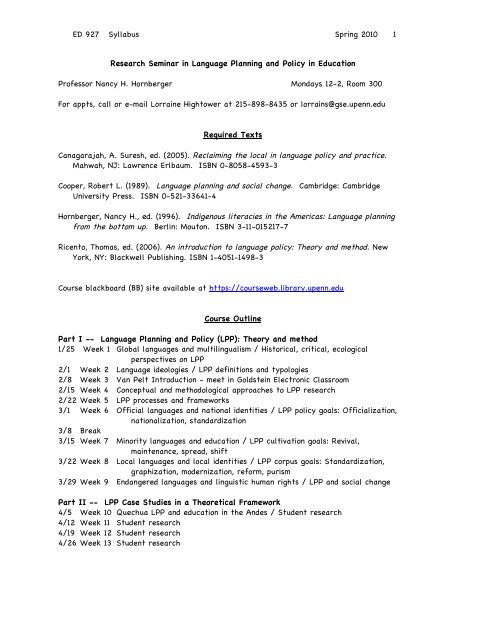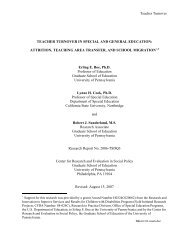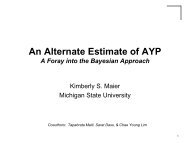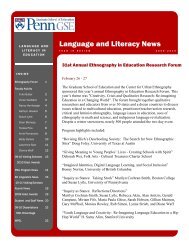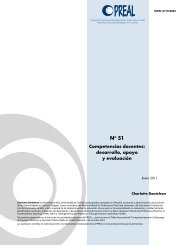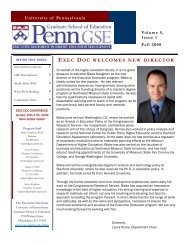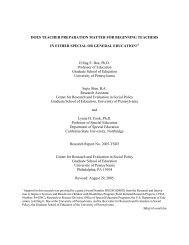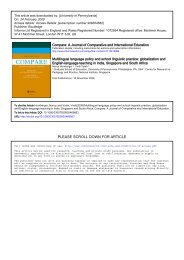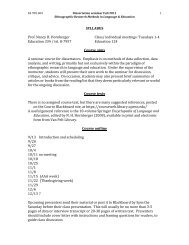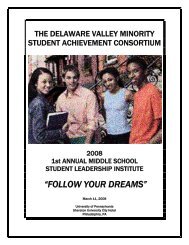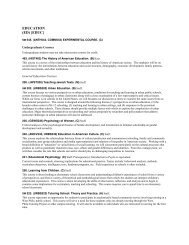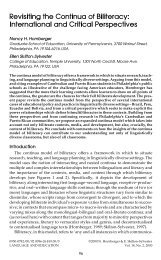Canagarajah, A. Suresh, ed. (2005). Reclaiming the ... - Penn GSE
Canagarajah, A. Suresh, ed. (2005). Reclaiming the ... - Penn GSE
Canagarajah, A. Suresh, ed. (2005). Reclaiming the ... - Penn GSE
You also want an ePaper? Increase the reach of your titles
YUMPU automatically turns print PDFs into web optimized ePapers that Google loves.
ED 927 Syllabus Spring 2010 1<br />
Research Seminar in Language Planning and Policy in Education<br />
Professor Nancy H. Hornberger Mondays 12-2, Room 300<br />
For appts, call or e-mail Lorraine Hightower at 215-898-8435 or lorrains@gse.upenn.<strong>ed</strong>u<br />
Requir<strong>ed</strong> Texts<br />
<strong>Canagarajah</strong>, A. <strong>Suresh</strong>, <strong>ed</strong>. (<strong>2005</strong>). <strong>Reclaiming</strong> <strong>the</strong> local in language policy and practice.<br />
Mahwah, NJ: Lawrence Erlbaum. ISBN 0-8058-4593-3<br />
Cooper, Robert L. (1989). Language planning and social change. Cambridge: Cambridge<br />
University Press. ISBN 0-521-33641-4<br />
Hornberger, Nancy H., <strong>ed</strong>. (1996). Indigenous literacies in <strong>the</strong> Americas: Language planning<br />
from <strong>the</strong> bottom up. Berlin: Mouton. ISBN 3-11-015217-7<br />
Ricento, Thomas, <strong>ed</strong>. (2006). An introduction to language policy: Theory and method. New<br />
York, NY: Blackwell Publishing. ISBN 1-4051-1498-3<br />
Course blackboard (BB) site available at https://courseweb.library.upenn.<strong>ed</strong>u<br />
Course Outline<br />
Part I -- Language Planning and Policy (LPP): Theory and method<br />
1/25 Week 1 Global languages and multilingualism / Historical, critical, ecological<br />
perspectives on LPP<br />
2/1 Week 2 Language ideologies / LPP definitions and typologies<br />
2/8 Week 3 Van Pelt Introduction - meet in Goldstein Electronic Classroom<br />
2/15 Week 4 Conceptual and methodological approaches to LPP research<br />
2/22 Week 5 LPP processes and frameworks<br />
3/1 Week 6 Official languages and national identities / LPP policy goals: Officialization,<br />
nationalization, standardization<br />
3/8 Break<br />
3/15 Week 7 Minority languages and <strong>ed</strong>ucation / LPP cultivation goals: Revival,<br />
maintenance, spread, shift<br />
3/22 Week 8 Local languages and local identities / LPP corpus goals: Standardization,<br />
graphization, modernization, reform, purism<br />
3/29 Week 9 Endanger<strong>ed</strong> languages and linguistic human rights / LPP and social change<br />
Part II -- LPP Case Studies in a Theoretical Framework<br />
4/5 Week 10 Quechua LPP and <strong>ed</strong>ucation in <strong>the</strong> Andes / Student research<br />
4/12 Week 11 Student research<br />
4/19 Week 12 Student research<br />
4/26 Week 13 Student research
ED 927 Syllabus Spring 2010 2<br />
Course Requirements<br />
• Keep up with <strong>the</strong> readings and participate in a focus<strong>ed</strong> and thoughtful way in seminar<br />
discussions, panel presentations, and oral reports. (30% of grade).<br />
• The success of this seminar for all participants depends heavily on each one's timely and<br />
thorough pursuit of your language planning case study. See description below. (Oral<br />
presentation - 35% of grade; paper - 35% of grade).<br />
• Students are expect<strong>ed</strong> to complete all course work within <strong>the</strong> semester. If extenuating<br />
circumstances mean you cannot turn in <strong>the</strong> written version of your study on time, you<br />
must request permission to take an incomplete from me at least 2 weeks before <strong>the</strong> end<br />
of <strong>the</strong> semester. To make up <strong>the</strong> incomplete, you must turn in your work at least 4<br />
weeks before <strong>the</strong> end of <strong>the</strong> semester in which you wish to receive a grade. If <strong>the</strong> work<br />
is not made up after 1 year, your incomplete becomes permanent.<br />
The Language Planning Case Study Requirement<br />
Within <strong>the</strong> first few weeks of <strong>the</strong> semester, you are expect<strong>ed</strong> to identify a language<br />
planning case in which you will become expert through library research. I encourage you to<br />
direct this project toward your dissertation research if you want to.<br />
You should spend <strong>the</strong> first few weeks exploring available resources on your topic. This<br />
syllabus includes some suggest<strong>ed</strong> general references on language planning. Please make an<br />
appointment to see me on an individual basis if you ne<strong>ed</strong> help in choosing your case or<br />
identifying resources. Part of each of <strong>the</strong> first several class meetings will be devot<strong>ed</strong> to<br />
consideration of your case study topics and any references or resources you have already<br />
identifi<strong>ed</strong> or know about. We will also hold one early meeting at Van Pelt Library, where a<br />
reference librarian will introduce you to some of <strong>the</strong> online resources Van Pelt offers.<br />
At <strong>the</strong> meeting one week before your presentation, you will provide multiple copies of 1 or 2<br />
essential readings for your case for <strong>the</strong> o<strong>the</strong>r seminar members to read in advance of your<br />
presentation. Please follow <strong>the</strong>se guidelines when submitting <strong>the</strong> readings:<br />
• keep <strong>the</strong> total length of <strong>the</strong> readings to 30 pages or less<br />
• make sure <strong>the</strong>y are legible all <strong>the</strong> way through<br />
• make sure <strong>the</strong>y are complete (no pages missing)<br />
• identify <strong>the</strong> author, source, date, and publisher on <strong>the</strong> first page of each reading.<br />
You must keep to <strong>the</strong> specifi<strong>ed</strong> time sch<strong>ed</strong>ule for <strong>the</strong> sake of <strong>the</strong> whole seminar.<br />
Beginning with Week 10, we will devote our seminar time to discussion of <strong>the</strong> cases you have<br />
research<strong>ed</strong>. You will be responsible for leading <strong>the</strong> class in discussion of your case, making<br />
sure that both your presentation and <strong>the</strong> discussion draw on <strong>the</strong> <strong>the</strong>oretical framework<br />
outlin<strong>ed</strong> in <strong>the</strong> first part of <strong>the</strong> course.<br />
The written version of your case study is due at our last course meeting. Please follow<br />
<strong>the</strong>se guidelines for <strong>the</strong> paper:<br />
• submit <strong>the</strong> paper in both hard copy and by email attachment to me<br />
• <strong>the</strong> paper should be no more than 30 double-spac<strong>ed</strong> typ<strong>ed</strong> pages in length, including<br />
references<br />
• use a standard style (APA style is <strong>the</strong> most usual in our field - see <strong>the</strong> Publication<br />
Manual of <strong>the</strong> American Psychological Association)<br />
• be consistent in your reference citation and please give specific page numbers (e.g.<br />
Fishman 1983:117).
ED 927 Syllabus Spring 2010 3<br />
Reading Outline: those mark<strong>ed</strong> with * are available on <strong>the</strong> class blackboard site.<br />
PART I. LANGUAGE PLANNING AND POLICY (LPP): THEORY AND METHOD<br />
Week 1. Global languages and multilingualism / Historical, critical, ecological<br />
perspectives on LPP i<br />
LP <strong>the</strong>ory and method, chapters by Ricento, Tollefson, <strong>Penn</strong>ycook<br />
<strong>Reclaiming</strong> <strong>the</strong> local in LPP, chapters by <strong>Canagarajah</strong>, Bhatt, Lin et al.<br />
*Ruiz, Richard (1984) Orientations in language planning. NABE Journal 8(2):15-34.<br />
*Phillipson, Robert & Tove Skutnabb-Kangas (1996) English only worldwide or language<br />
ecology? TESOL Quarterly 30(3), 429-452.<br />
*Ricento, Thomas & Nancy Hornberger (1996) Unpeeling <strong>the</strong> onion: Language planning and<br />
policy and <strong>the</strong> ELT professional. TESOL Quarterly 30(3), 401-428.<br />
Week 2. Language ideologies / LPP definitions and typologies<br />
LP <strong>the</strong>ory and method, chapters by Schmidt, Schiffman<br />
LP and social change, chapters 1 & 2 (LP cases & definitions)<br />
*Garvin, Paul L. (1974). Some comments on language planning. In Advances in Language<br />
Planning, <strong>ed</strong>it<strong>ed</strong> by Joshua Fishman. 69-78.<br />
*Neustupny, J.V. (1974). Basic types of treatment of language problems. In Advances in<br />
Language Planning, <strong>ed</strong>it<strong>ed</strong> by Joshua Fishman. 37-48.<br />
*Shohamy, E. (2006). Expanding language policy. In Language Policy: Hidden Agendas and New<br />
Approaches (pp. 45-57). London: Routl<strong>ed</strong>ge.<br />
*Spolsky, B. (2007). Towards a <strong>the</strong>ory of language policy. Working Papers in Educational Linguistics,<br />
22(1), 1-14.<br />
Week 3.<br />
Van pelt introduction /Research topics explor<strong>ed</strong> on databases<br />
Week 4. Conceptual and methodological approaches to LPP research<br />
LP <strong>the</strong>ory and method, chapters by Grin, Wiley, <strong>Canagarajah</strong>, Wodak, Baker<br />
*Hornberger, N. H., & Johnson, D. C. (2007) Slicing <strong>the</strong> onion ethnographically: Layers and spaces in<br />
multilingual language <strong>ed</strong>ucation policy and practice. TESOL Quarterly, 41(3), 509-532.<br />
*Cross, R. (2009) A sociocultural framework for language policy and planning. Language Problems and<br />
Language Planning, 33(1), 22-42.<br />
*Hult, F. M. (2010). Analysis of language policy discourses across <strong>the</strong> scales of space and time.<br />
International Journal of <strong>the</strong> Sociology of Language.<br />
*Hornberger, N. H., & D. C. Johnson (2010) The ethnography of language policy. In Ethnography and<br />
Language Policy, <strong>ed</strong>it<strong>ed</strong> by T. L. McCarty (Routl<strong>ed</strong>ge).<br />
*Lo Bianco, J. (2010). Language policy and planning. In Sociolinguistics and Language Education, <strong>ed</strong>it<strong>ed</strong><br />
by N. H. Hornberger & S. L. McKay (Multilingual Matters).<br />
Week 5. LPP processes and frameworks ii<br />
LP and social change, chapters 3 & 4 (LP frameworks: management of innovation, marketing,<br />
pursuit and maintenance of power, decision-making)<br />
*Karam, Francis X. (1974) Toward a definition of language planning. In Advances in Language<br />
Planning, <strong>ed</strong>it<strong>ed</strong> by J. Fishman. 103-124.<br />
*Fishman, J. (1979) Bilingual <strong>ed</strong>ucation, language planning and English. English World-Wide<br />
1(1): 11-24.<br />
*Haugen, Einar (1983) The implementation of corpus planning: Theory and practice. In<br />
Progress in Language Planning, <strong>ed</strong>it<strong>ed</strong> by Juan Cobarrubias. 269-290.
ED 927 Syllabus Spring 2010 4<br />
Week 6. Official languages and national identities / LPP policy goals: Officialization,<br />
nationalization, standardization iii<br />
LP <strong>the</strong>ory and method, chapters by Blommaert, Hornberger<br />
LP and social change, chapter 5 (status planning)<br />
<strong>Reclaiming</strong> <strong>the</strong> local in LPP, chapter by Utakis & Pita<br />
*Rabin, Chaim (1971). A tentative classification of language planning aims. In Can language<br />
be plann<strong>ed</strong>? Sociolinguistic <strong>the</strong>ory and practice for developing nations, <strong>ed</strong>it<strong>ed</strong> by Joan<br />
Rubin and Bjorn Jernudd. 277-279.<br />
*Nahir, Moshe (1984). Language planning goals: a classification. In Language Problems and<br />
Language Planning 8(3): 294-327.<br />
*Ruiz, Richard (1990). Official languages and language planning. In Perspectives on Official<br />
English, <strong>ed</strong>it<strong>ed</strong> by K. Adams & D. Brink. 11-24.<br />
BREAK<br />
Week 7. Minority languages and <strong>ed</strong>ucation iv / LPP cultivation goals: Revival,<br />
maintenance, spread, shift<br />
LP <strong>the</strong>ory and method, chapters by Paulston & Heidemann, Fishman<br />
LP and social change, chapter 7 (acquisition planning)<br />
<strong>Reclaiming</strong> <strong>the</strong> local in LPP, chapters by Martin, Mermann et al.<br />
*Fishman, Joshua (1969). National languages and languages of wider communication in <strong>the</strong><br />
developing nations. Anthropological Linguistics 11(4):111-135.<br />
*Cobarrubias, Juan (1983). Ethical issues in status planning. In Progress in Language<br />
Planning, <strong>ed</strong>it<strong>ed</strong> by J. Cobarrubias. 41-86.<br />
Week 8. Local languages and local identities / LPP corpus goals: Standardization,<br />
graphization, modernization, reform, purism<br />
LP and social change, chapter 6 (corpus planning)<br />
<strong>Reclaiming</strong> <strong>the</strong> local in LPP, chapters by Ryon, Souza<br />
Indigenous literacies in <strong>the</strong> Americas, chapters by González Ventura, López<br />
*Ferguson, Charles A. (1968). Language development. In Language Problems of Developing<br />
Nations, <strong>ed</strong>it<strong>ed</strong> by J. Fishman, C. A. Ferguson, & J. Das Gupta. 27-35.<br />
*Dorian, Nancy (1994). Purism vs. compromise in language revitalization and language revival.<br />
Language in Society 23: 479-494.<br />
Week 9: Endanger<strong>ed</strong> languages and linguistic human rights v / LPP and social change<br />
LP <strong>the</strong>ory and method, chapter by May<br />
LP and social change, chapters 8 & 9 (social change & concluding summary)<br />
Indigenous literacies in <strong>the</strong> Americas, chapters by Dick & McCarty, Watahomigie & McCarty,<br />
Benjamin et al., & Hornberger conclusion<br />
*Fishman, Joshua (1991). Theoretical recapitulation: What is reversing language shift (RLS)<br />
and how can it succe<strong>ed</strong>? In Reversing Language Shift, by Joshua Fishman. 381-419.<br />
*Phillipson, R, M. Rannut, & T. Skutnabb-Kangas (1995). Introduction. In Linguistic Human<br />
Rights, <strong>ed</strong>it<strong>ed</strong> by T. Skutnabb-Kangas & R. Phillipson. 1-22.
ED 927 Syllabus Spring 2010 5<br />
PART II.<br />
CASE STUDIES IN A THEORETICAL FRAMEWORK<br />
Week 10. Quechua LPP and <strong>ed</strong>ucation in <strong>the</strong> Andes vi / Student research<br />
* Hornberger, N. H. (2006). Voice and biliteracy in indigenous language revitalization: Contentious<br />
<strong>ed</strong>ucational practices in quechua, guarani, and maori contexts. Journal of Language, Identity, and<br />
Education, 5(4), 277-292.<br />
*Hornberger, N. H., & Hult, F. M. (2007). Ecological language <strong>ed</strong>ucation policy. In B. Spolsky & F. M.<br />
Hult (Eds.), Handbook of <strong>ed</strong>ucational linguistics (pp. 280-296). New York: Blackwell Publishers.<br />
*King, K. A., & Hornberger, N. H. (2006). Quechua as a lingua franca. Annual Review of Appli<strong>ed</strong><br />
Linguistics, 26, 177-194.<br />
Weeks 11-13.<br />
Student research<br />
Additional References on Language Planning<br />
Reference lists attach<strong>ed</strong> and also available on course BB for<br />
LPP case studies (book-length)<br />
LPP monographs<br />
LPP <strong>ed</strong>it<strong>ed</strong> volumes<br />
External Links on BB to:<br />
LPP periodicals<br />
Websites on LPP issues<br />
LPP case study resource file drawer -- ask NHH<br />
Language Planning Newsletter (1972-1984) and New Language Planning Newsletter<br />
(1980) – ask NHH<br />
*available on BB<br />
i<br />
Select<strong>ed</strong> supplementary readings (week 1 – historical and <strong>the</strong>oretical perspectives):<br />
*Hornberger, Nancy H. (2002) Multilingual language policies and <strong>the</strong> continua of biliteracy: An ecological<br />
approach. Language Policy, 1(1), 27-51.<br />
Paulston, Christina Bratt, & G. Richard Tucker, <strong>ed</strong>s. (1997) The Early Days of Sociolinguistics: Memories<br />
and Reflections. Dallas, Texas: Summer Institute of Linguistics.<br />
*Ricento, Thomas (2000) Historical and <strong>the</strong>oretical perspectives in language policy and planning. Journal<br />
of Sociolinguistics, 4(2), 196-213.<br />
Wiley, Terrence G. (1996) Language planning and policy. In Sociolinguistics and Language Teaching,<br />
<strong>ed</strong>it<strong>ed</strong> by S. McKay & N. Hornberger. 103-147.<br />
ii<br />
Select<strong>ed</strong> supplementary reading (week 5 – processes and frameworks):<br />
Bamgbose, Ayo (1989) Issues for a model of language planning. Language Problems and Language<br />
Planning 13: 24-34.<br />
Rubin, Joan (1986) City planning and language planning. In Language Planning: Proce<strong>ed</strong>ings of an<br />
Institute, <strong>ed</strong>it<strong>ed</strong> by E. Annamalai, B. Jernudd, & J. Rubin. 105-122.<br />
*Shohamy, E. (2003) Implications of language <strong>ed</strong>ucation policies for language study in schools and universities.<br />
Modern Language Journal, 87, 278-286.<br />
Tollefson, James W. (1981) Centraliz<strong>ed</strong> and decentraliz<strong>ed</strong> language planning. Language Problems and<br />
Language Planning 5(2): 175-188.<br />
iii<br />
Select<strong>ed</strong> supplementary readings (week 6 – status and acquisition policy):<br />
Dogançay-Aktuna, Seran (1997) Language planning. In Research Methods in Language and Education,<br />
<strong>ed</strong>it<strong>ed</strong> by N. Hornberger & D. Corson.
ED 927 Syllabus Spring 2010 6<br />
*Hornberger, Nancy (1994) Literacy and language planning. Language and Education 8(1-2): 75-86.<br />
Markee, Numa, <strong>ed</strong>. (2002) Language in Development. TESOL Quarterly, 36(2), entire.<br />
Rubin, Joan (1977) Bilingual <strong>ed</strong>ucation and language planning. In Frontiers of Bilingual Education, <strong>ed</strong>it<strong>ed</strong><br />
by B. Spolsky & R. L. Cooper. 282-294.<br />
iv Select<strong>ed</strong> supplementary readings (week 7 – status and acquisition cultivation):<br />
Wiley, Terrence G., & Guadalupe Valdés, <strong>ed</strong>s. (2000) Heritage Language Instruction in <strong>the</strong> Unit<strong>ed</strong><br />
States: A Time for Renewal. Bilingual Research Journal, 24(4), Entire issue.<br />
Peyton, Joy Kreeft, Donald A. Ranard, & Scott McGinnis, <strong>ed</strong>s. (2001) Heritage Languages in America:<br />
Preserving a National Resource. Washington DC: Center for Appli<strong>ed</strong> Linguistics.<br />
Campbell, Russell, et al. (2002) Intergenerational transfer of heritage languages. Heritage Language<br />
Journal, www.heritagelanguages.org.<br />
*Hornberger, Nancy H., <strong>ed</strong>. (<strong>2005</strong>) Heritage/Community Language Education: US and Australian<br />
Perspectives. International Journal of Bilingual Education and Bilingualism 7(3).<br />
Hornberger, N. H., & Wang, S. C. (2008) Who are our heritage language learners? Identity and biliteracy in<br />
heritage language <strong>ed</strong>ucation in <strong>the</strong> Unit<strong>ed</strong> States. In D. M. Brinton, O. Kagan & S. Bauckus (<strong>ed</strong>s.), Heritage<br />
language <strong>ed</strong>ucation: A new field emerging (pp. 3-35). New York and London: Routl<strong>ed</strong>ge.<br />
v Select<strong>ed</strong> supplementary readings (week 9 – endanger<strong>ed</strong> languages):<br />
Paulston, C. B. (1997) Language policies and language rights. Annual Review of Anthropology, 26: 73-85.<br />
*<strong>Penn</strong>ycook, A. (2004). Language policy and <strong>the</strong> ecological turn. Language Policy, 3(3), 213-239.<br />
*Romaine, S. (2006). Planning for <strong>the</strong> survival of linguistic diversity. Language Policy, 5, 441-473.<br />
vi<br />
Select<strong>ed</strong> supplementary readings (week 10 – Quechua LPP):<br />
Indigenous literacies in <strong>the</strong> Americas, chapters by Hornberger, Godenzzi, Chirinos, Hornberger & King<br />
*Hornberger, Nancy (1995). Five vowels or three? Linguistics and politics in Quechua language planning<br />
in Peru. In J. W. Tollefson (Ed.) Power and Inequality in Language Education. Cambridge<br />
University Press, 187-205.<br />
*Hornberger, Nancy H. & Kendall A. King (1996). Language revitalization in <strong>the</strong> Andes: Can <strong>the</strong> schools<br />
reverse language shift? Journal of Multilingual and Multicultural Development 17(6), 427-441.<br />
Hornberger, Nancy H., & Luis Enrique López (1998). Policy, possibility and paradox: Indigenous<br />
multilingualism and <strong>ed</strong>ucation in Peru and Bolivia. In J. Cenoz & F. Genesee (Eds.), Beyond<br />
Bilingualism: Multilingualism and Multilingual Education (pp. 206-242). Clev<strong>ed</strong>on, England:<br />
Multilingual Matters.<br />
*Hornberger, Nancy H., & Kendall A. King (2001). Reversing Quechua language shift in South America. In<br />
J. A. Fishman (Ed.), Can Threaten<strong>ed</strong> Languages be Sav<strong>ed</strong>? "Reversing Language Shift" Revisit<strong>ed</strong>: A<br />
21st Century Perspective (pp. 166-194). Clev<strong>ed</strong>on, UK: Multilingual Matters.<br />
*Hornberger, Nancy H., & Serafin M. Coronel-Molina (2004). Quechua language shift, maintenance and<br />
revitalization in <strong>the</strong> Andes: The case for language planning. International Journal of <strong>the</strong> Sociology<br />
of Language.<br />
*Mannheim, Bruce (1984). Una nación acorralada: Sou<strong>the</strong>rn Peruvian Quechua language planning and<br />
politics in historical perspective. Language in Society 13(3):291-309.
ED 927 Syllabus Spring 2010 7<br />
LPP case studies<br />
Alexander, Neville (2000) English unassailable but unattainable: The dilemma of language policy in South<br />
African <strong>ed</strong>ucation (Occasional Papers 3). Cape Town, South Africa: PRAESA.<br />
Amery, Rob (2000) Warrabarna Haurna: <strong>Reclaiming</strong> an Australian Language. Lisse, The Ne<strong>the</strong>rlands:<br />
Swets & Zeitlinger.<br />
Bourhis, Richard Y. (1984) Conflict and Language Planning in Quebec. Avon, England: Multilingual<br />
Matters.<br />
Chen, Suchiao (2003) The spread of English in Taiwan: Changing uses and shifting attitudes. Taipei:<br />
Crane Publishing.<br />
Crawford, James (1992) Hold Your Tongue: Bilingualism and <strong>the</strong> Politics of English-Only. Addison-<br />
Wesley.<br />
Das Gupta, Jyotirinda (1970) Language Conflict and National Development: Group Politics and National<br />
Language Policy in India. Berkeley, California: University of California Press.<br />
Davis, Kathryn (1994) Language Planning in Multilingual Contexts: Policies, Communities, and Schools in<br />
Luxembourg. Philadelphia: John Benjamins.<br />
Dua, Hans (1985) Language Planning in India. New Delhi: Harnam Publishers.<br />
Haugen, Einar (1966) Language Conflict and Language Planning: The Case of Modern Norwegian.<br />
Cambridge, Massachusetts: Harvard University Press.<br />
Heath, Shirley B.(1972) Telling Tongues: Language Policy in Mexico, Colony to Nation.<br />
New York: Teachers College Press.<br />
Hornberger, Nancy H. (1988) Bilingual Education and Language Maintenance: A Sou<strong>the</strong>rn Peruvian<br />
Quechua Case. Berlin: Mouton.<br />
Jaffe, Alexandra. (1999) Ideologies in Action: Language Politics on Corsica. Berlin: Mouton.<br />
Kaplan, Robert, & Richard B. Baldauf, Jr. (2002) Language and Language-in-Education Planning in <strong>the</strong><br />
Pacific Basin.: Kluwer Academic Publishers.<br />
King, Kendall A. (2000) Language Revitalization Processes and Prospects: Quichua in <strong>the</strong> Ecuadorian<br />
Andes. Clev<strong>ed</strong>on, UK: Multilingual Matters.<br />
Kloss, Heinz (1977) The American Bilingual Tradition. Rowley, Mass: Newbury House.<br />
Rowley, Mass: Newbury House.<br />
Levine, Marc V. (1990) The Reconquest of Montreal: Language Policy and Social Change in a Bilingual<br />
City. Temple University Press.<br />
McCarty, Teresa L. (2002) A Place To Be Navajo--Rough Rock and <strong>the</strong> Struggle for Self-Determination<br />
in Indigenous Schooling. Mahwah, NJ: Lawrence Erlbaum.<br />
Mühlhäusler, Peter. (1996) Linguistic Ecology: Language Change and Linguistic Imperialism in <strong>the</strong> Pacific<br />
Region. London: Routl<strong>ed</strong>ge.<br />
Patrick, D. (2003) Language, politics, and social interaction in an Inuit community. Berlin: Mouton.<br />
Peranteau, Paul. (2001) Language and National Identity: Comparing France and Switzerland.<br />
Philadelphia: John Benjamins.<br />
Ramanathan, V. (<strong>2005</strong>) The English-Vernacular Divide: Postcolonial Language Politics and Practice (Vol.<br />
BEB 49). Clev<strong>ed</strong>on, UK: Multilingual Matters.<br />
Romaine, Suzanne (1992) Language, Education, and Development: Urban and Rural Tok Pisin in Papua<br />
New Guinea. Oxford: Clarendon Press.<br />
Spolsky, Bernard, & E. Shohamy (1999) The Languages of Israel: Policy, Ideology, and Practice. Clev<strong>ed</strong>on,<br />
UK: Multilingual Matters.<br />
Tollefson , James W. (1981) The Language Situation and Language Policy in Slovenia.<br />
Washington D.C.: University Press of America.<br />
Webb, Victor (2002) Language in South Africa: The Role of Language in National Transformation,<br />
Reconstruction, and Development. Philadelphia: John Benjamins.<br />
Woolard, Kathryn A. (1989) Double Talk: Bilingualism and <strong>the</strong> Politics of Ethnicity in Catalonia.<br />
Stanford: Stanford University Press.
ED 927 Syllabus Spring 2010 8<br />
LPP monographs<br />
Blackl<strong>ed</strong>ge, A. (<strong>2005</strong>). Discourse and Power in a Multilingual World. Philadelphia: John Benjamins.<br />
Corson, David (1999). Language Policy in Schools: A Resource for Teachers and Administrators. Mahwah,<br />
NJ: Lawrence Erlbaum.<br />
Coulmas, Florian (1989). Language Adaptation. Cambridge University Press.<br />
Crawford, James (2000). At War with Diversity: U.S. Language Policy in an Age of Anxiety. Clev<strong>ed</strong>on,<br />
UK: Multilingual Matters.<br />
Crawford, James (1992). Language Loyalties: A Source Book on <strong>the</strong> Official English Controversy.<br />
Chicago: University of Chicago Press.<br />
Cummins, Jim (2000). Language, Power and P<strong>ed</strong>agogy: Bilingual Children in <strong>the</strong> Crossfire. Clev<strong>ed</strong>on, UK:<br />
Multilingual Matters.<br />
Ferguson, G. (2006). Language Planning and Education. Edinburgh: Edinburgh University Press.<br />
Fishman, J. A. (1991). Reversing Language Shift: Theoretical and Empirical Foundations of Assistance to<br />
Threaten<strong>ed</strong> Languages. Clev<strong>ed</strong>on, UK: Multilingual Matters.<br />
Harrison, K. David (2007). When languages die: The extinction of <strong>the</strong> world's languages and <strong>the</strong> erosion of human<br />
knowl<strong>ed</strong>ge. New York: Oxford.<br />
Hinton, Leanne. (2002) How to Keep Your Language Alive: A Commonsense Approach to One-on-One<br />
Language Learning. Berkeley, CA: Heyday Books.<br />
Jernudd, Bjorn (1990). Lectures on Language Problems. New Delhi: Bahri Publications.<br />
Kaplan, Robert B. & Richard B. Baldauf, Jr. (1997). Language Planning: From Practice to Theory.<br />
Clev<strong>ed</strong>on: Multilingual Matters. ISBN 1-85359-371-0.<br />
Maffi, Luisa (2001) On Biocultural Diversity: Linking Language, Knowl<strong>ed</strong>ge, and <strong>the</strong> Environment.<br />
Washington DC: Smithsonian Institution Press.<br />
Mar-Molinero, C. (2000). The politics of language in <strong>the</strong> Spanish-speaking world. London: Routl<strong>ed</strong>ge.<br />
May, S. (2001). Language and minority rights: Ethnicity, nationalism and <strong>the</strong> politics of language. Essex, UK:<br />
Pearson Education.<br />
Milroy, James & Lesley Milroy (1985). Authority in Language: Investigating Language Prescription and<br />
Standardisation. London: Routl<strong>ed</strong>ge and Kegan Paul.<br />
<strong>Penn</strong>ycook, Alastair (1998). English and <strong>the</strong> Discourses of Colonialism. London: Routl<strong>ed</strong>ge.<br />
Schmidt, R. (2000). Language Policy and Identity Politics in <strong>the</strong> Unit<strong>ed</strong> States. Philadelphia: Temple<br />
University Press.<br />
Sebba, M. (2007). Spelling and Society: The Culture and Politics of Orthography around <strong>the</strong> World.<br />
Cambridge: Cambridge University Press.<br />
Shohamy, E. (2006). Language Policy: Hidden Agendas and New Approaches. London: Routl<strong>ed</strong>ge.<br />
Skutnabb-Kangas, Tove (2000) Linguistic Genocide in Education--or Worldwide Diversity and Human<br />
Rights? Mahwah, NJ: Lawrence Erlbaum.<br />
Spolsky, B. (2004). Language Policy. Cambridge: Cambridge University Press.<br />
Spolsky, B. (2009). Language Management: Cambridge University Press.<br />
Weinstein, Brian (1983). The Civic Tongue: Political Consequences of Language Choices. New York and<br />
London: Longman.<br />
Wright, S. (2004). Language policy and language planning: From nationalism to globalisation. New York: Palgrave<br />
Macmillan.
ED 927 Syllabus Spring 2010 9<br />
LPP <strong>ed</strong>it<strong>ed</strong> volumes<br />
Ammon, Ulrich, <strong>ed</strong>. (1989) Status and Function of Languages and Language Varieties. Berlin: Mouton.<br />
Annamalai, E., Björn Jernudd, & Joan Rubin, <strong>ed</strong>s. (1986) Language Planning: Proce<strong>ed</strong>ings of an Institute.<br />
Mysore, India: Central Institute of Indian Languages.<br />
Brinton, D. M., O. Kagan, & S. Bauckus, <strong>ed</strong>s. (2008) Heritage language <strong>ed</strong>ucation: A new field emerging.<br />
New York: Routl<strong>ed</strong>ge.<br />
Cobarrubias, Juan and Joshua Fishman, <strong>ed</strong>s. (1983) Progress in Language Planning: International<br />
Perspectives. New York: Mouton.<br />
Coulmas, Florian, <strong>ed</strong>. (1988) With Fork<strong>ed</strong> Tongues: What are National Languages Good For? Singapore:<br />
Karoma Publishers.<br />
Cooper, R. L., E. Shohamy, & J. Walters, ,<strong>ed</strong>s. (2001) New Perspectives and Issues in Educational<br />
Language Policy: A Festschrift for Bernard Dov Spolsky. Amsterdam/Philadelphia: John Benjamins.<br />
Creese, A., & P. Martin, <strong>ed</strong>s. (2003) Multilingual Classroom Ecologies: Inter-relationships, Interactions<br />
and Ideologies (Vol. BEB 44). Clev<strong>ed</strong>on, UK: Multilingual Matters.<br />
Duchene, A., & M. Heller, <strong>ed</strong>s. (2007) Discourses of endangerment: Ideology and interest in <strong>the</strong> defence<br />
of languages. Continuum.<br />
Elangaiyan, R., R.M. Brown, N. Ostler, & M.K. Verma, <strong>ed</strong>s. (2007) Vital voices: Endanger<strong>ed</strong> languages and<br />
multilingualism. Bath, UK/Mysore, India: Foundation for Endanger<strong>ed</strong> Languages/Central Institute of<br />
Indian Languages.<br />
Fishman, Joshua A., <strong>ed</strong>. (2000) Can Threaten<strong>ed</strong> Languages be Sav<strong>ed</strong>? "Reversing Language Shift"<br />
Revisit<strong>ed</strong>. Clev<strong>ed</strong>on, UK: Multilingual Matters.<br />
Fishman, Joshua A., <strong>ed</strong>. (1993) The Earliest Stage of Language Planning: The "First Congress"<br />
Phenomenon. Mouton de Gruyter.<br />
Fishman, Joshua A., <strong>ed</strong>. (1974) Advances in Language Planning. The Hague: Mouton.<br />
Fishman, Joshua A., Charles A. Ferguson, and Jyotirinda das Gupta, <strong>ed</strong>s. (1968) Language Problems of<br />
Developing Nations. New York: Wiley and Sons.<br />
Fodor, Istvan & Claude Hagege, <strong>ed</strong>s. (1983/84) Language Reform: History and Future/La Reform des<br />
Langues: Histoire et Avenir/Sprachreform: Geschichte und Zukunft. Hamburg:Buske Verlag. 6 vols.<br />
Freeland, Jane (1999) Indigenous Language Maintenance in Latin America. International Journal of<br />
Bilingual Education and Bilingualism, 2(3), entire issue.<br />
Freeland, J., & D. Patrick, <strong>ed</strong>s. (2004) Language rights and language survival: Sociolinguistic and<br />
sociocultural perspectives. Manchester, UK: St. Jerome.<br />
García, O., T. Skutnabb-Kangas, & M.E. Torres-Guzmán, <strong>ed</strong>s. (2006) Imagining Multilingual Schools:<br />
Languages in Education and Glocalization. Clev<strong>ed</strong>on, UK: Multilingual Matters.<br />
Gopinathan, S. et al., <strong>ed</strong>s. (1994) Language, Society and Education in Singapore: Issues and Trends.<br />
Singapore: Times Academic Press.<br />
Hall, Joan Kelly, & William Eggington, <strong>ed</strong>s. (2000) The Sociopolitics of English Language Teaching.<br />
Clev<strong>ed</strong>on, UK: Multilingual Matters.<br />
Hinton, Leanne, & Kenneth Hale, <strong>ed</strong>s. (2001). The Green Book of Language Revitalization in Practice. San<br />
Diego & New York: Academic Press.<br />
Hornberger, N. H., <strong>ed</strong>. (2008) Can Schools save Indigenous languages? Policy and practice on four<br />
continents. Basingstoke: Palgrave Macmillan.<br />
Hornberger, N. H., & M. Pütz, <strong>ed</strong>s. (2006) Language loyalty, language planning, and language<br />
revitalization: Recent writings and reflections from Joshua A. Fishman. Clev<strong>ed</strong>on, UK: Multilingual<br />
Matters.<br />
Huebner, Thomas, & Kathryn Davis, <strong>ed</strong>s. (1999) Sociopolitical Perspectives on Language Planning and<br />
Policy in <strong>the</strong> USA. Philadelphia: John Benjamins.<br />
Kenn<strong>ed</strong>y, Chris, <strong>ed</strong>.(1983) Language Planning and Language Education. London: G. Allen & Unwin.<br />
King, K. A., N. Schilling-Estes, L. Fogle, J.J. Lou, & B. Soukup, <strong>ed</strong>s. (2008) Sustaining Linguistic Diversity:<br />
Endanger<strong>ed</strong> and Minority Languages and Language Varieties. Washington DC: Georgetown U Press.<br />
Kontra, Miklós, Robert Phillipson, Tove Skutnabb-Kangas, & Tibor Várady, <strong>ed</strong>s. (1999). Language: A Right<br />
and a Resource. Budapest: Central European University Press.<br />
Laforge, Lorne, <strong>ed</strong>. (1987) Actes du Colloque International Sur L'Aménagement Linguistique/ Proce<strong>ed</strong>ings<br />
of <strong>the</strong> International Colloquium on Language Planning (Ottawa 25-29 May 1986) Québec: Les<br />
Presses de L'Université Laval.
ED 927 Syllabus Spring 2010 10<br />
Lambert, Richard, <strong>ed</strong>. (1994) Language Planning Around <strong>the</strong> World: Contexts and Systemic Change.<br />
Washington DC: National Foreign Language Center<br />
Lihani, John, <strong>ed</strong>. (1988) Global Demands on Language and <strong>the</strong> Mission of <strong>the</strong> Language Academies.<br />
Lexington, Kentucky:University of Kentucky.<br />
Lin, A. M. Y., & P. W. Martin, <strong>ed</strong>s. (<strong>2005</strong>) Decolonisation, Globalisation: Language-in-Education Policy<br />
and Practice. Clev<strong>ed</strong>on, UK: Multilingual Matters.<br />
Mar-Molinero, C., & Stevenson, P., <strong>ed</strong>s. (2006) Language ideologies, policies, and practices: Language<br />
and <strong>the</strong> future of Europe. Basingstoke: Palgrave Macmillan.<br />
Marshall, David, <strong>ed</strong>. (1991) Language Planning: Focusschrift in Honor of Joshua A. Fishman, Volume 3.<br />
Philadelphia: John Benjamins Publishers.<br />
Maurais, J., & M. A. Morris, <strong>ed</strong>s. (2003) Languages in a globalising world. Cambridge University Press.<br />
May, Stephen & Nancy H. Hornberger, <strong>ed</strong>s. (2008) Encyclop<strong>ed</strong>ia of Language and Education, Volume 1:<br />
Language Policy and Political Issues in Education. Springer (online via Van Pelt).<br />
McCarty, T. L., & O. Zep<strong>ed</strong>a, <strong>ed</strong>s. (2006) One voice, many voices: Recreating indigenous language<br />
communities. Tempe and Tucson, Arizona: Arizona State University Center for Indian Education/<br />
University of Arizona American Indian Language Development Institute.<br />
McKay, Sandra Lee, & Sau-ling Wong, <strong>ed</strong>s. (2000). New Immigrants in <strong>the</strong> Unit<strong>ed</strong> States: Readings for<br />
Second Language Educators. New York: Cambridge University Press.<br />
Nettle, D., & Romaine, S. (2000) Vanishing Voices : The Extinction of <strong>the</strong> World's Languages. New York:<br />
Oxford University Press.<br />
Ostler, Nicholas, & Blair Rudes, <strong>ed</strong>s. (2000) Endanger<strong>ed</strong> Languages and Literacy. Foundation for<br />
Endanger<strong>ed</strong> Languages.<br />
Ovando, Carlos J., & Peter McLaren, <strong>ed</strong>s. (2000) The Politics of Multiculturalism and Bilingual Education:<br />
Students and Teachers Caught in <strong>the</strong> Cross Fire. Boston: McGraw-Hill.<br />
Ricento, Thomas, <strong>ed</strong>. (2000) Ideology, Politics and Language Policies: Focus on English. Philadelphia: John<br />
Benjamins.<br />
Ricento, Thomas, & B. Burnaby, <strong>ed</strong>s. (1998) Language and Politics in <strong>the</strong> Unit<strong>ed</strong> States and Canada:<br />
Myths and Realities. Mahwah, NJ: Lawrence Erlbaum.<br />
Rubin, Joan, <strong>ed</strong>. (1979) Directory of Language Planning Organizations. Honolulu: East-West Center.<br />
Rubin, Joan, <strong>ed</strong>. (1976) International Journal of <strong>the</strong> Sociology of Language, Volume 11.<br />
Rubin, Joan, J. Fishman, B. Jernudd, J. das Gupta, & C. Ferguson, <strong>ed</strong>s. (1977) Language Planning<br />
Processes. The Hague: Mouton.<br />
Rubin, Joan & Björn Jernudd, <strong>ed</strong>s. (1971) Can language be plann<strong>ed</strong>? Sociolinguistic <strong>the</strong>ory and practice<br />
for developing nations. Honolulu: U. Press of Hawaii.<br />
Rubin, Joan & Björn Jernudd, <strong>ed</strong>s. (1977) References for Students of Language Planning. Honolulu:<br />
East-West Center.<br />
Rubin, Joan & Roger Shuy, <strong>ed</strong>s. (1973) Language Planning: Current Issues and Research.<br />
Georgetown University Press.<br />
Savard, Jean-Guy & Richard Vigneault, <strong>ed</strong>s. (1975) Les Etats Multilingues: problemes et solutions.<br />
Quebec: Presses de l'Université Laval.<br />
Shohamy, E., & D. Gorter, <strong>ed</strong>s. (2008) Linguistic Landscape: Expanding <strong>the</strong> Scenery. Routl<strong>ed</strong>ge.<br />
Spolsky, B.,<strong>ed</strong>.(2009) Language Policy and Language Assessment.Annual Review of Appli<strong>ed</strong> Linguistics 29.<br />
Tollefson, J. W., & A. B. M. Tsui, <strong>ed</strong>s. (2004) M<strong>ed</strong>ium of instruction policies: Which agenda? Whose<br />
agenda? Mahwah, NJ: Lawrence Erlbaum.<br />
Tollefson, James, <strong>ed</strong>. (2002) Language Policies in Education: Critical Issues. Mahwah, NJ: Lawrence<br />
Erlbaum. ISBN 0-805-83601-2.<br />
Tollefson, James W., <strong>ed</strong>. (1995) Power and Inequality in Language Education. Cambridge U Press.<br />
Tsui, A. B. M., & Tollefson, J. W., <strong>ed</strong>s. (2006) Language policy, culture, and identity in Asian contexts.<br />
Mahwah, NJ: Lawrence Erlbaum.<br />
Weinstein, Brian, <strong>ed</strong>. (1990) Language Policy and Political Development. Norwood, New Jersey: Ablex.<br />
Wiley, T. G., & A. J. Artiles, <strong>ed</strong>s. (2007) English, p<strong>ed</strong>agogy, and globalization. International Multilingual<br />
Research Journal, 1(2), entire issue.<br />
Wodak, Ruth, & D. Corson, <strong>ed</strong>s. (1997) Language Policy and Political Issues in Education. Dordrecht, The<br />
Ne<strong>the</strong>rlands: Kluwer Academic.


